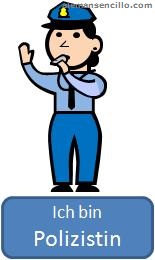Greetings and Introduction in German
How do you say hello and introduce yourself in German?
The basics of the German language. Greetings, saying goodbye and basic phrases to start speaking German
- 1 Saying hello
- 2 Saying our name
- 3 Asking what another person’s name is
- 4 Saying what our profession is
- 5 Asking what another person’s profession is
- 6 Saying Your Age
- 7 Asking how old someone is
- 8 Saying where you are from
- 9 Where we are from and where we live
- 10 Asking about someone’s nationality
- 11 Language knowledge
- 12 Asking about someone’s German
- 13 Being Polite
- 14 What to say at special occasions
- 15 Saying Goodbye
- 16 Summary
- 17 Audiovisual supplement
Welcome to the first article for learning German from GermanVeryEasy.com. We hope that the material we have prepared is helpful to you.
Here we go!
Saying hello

Hello in German is as easy as saying:
Hallo!
Hello!
The following is a list of the most common greetings in German:
| Greetings | Meaning |
|---|---|
| Hallo | Hello |
| Servus | Hello (southern Germany) |
| Moin | Hello (northern Germany) |
| Grüß Dich | Hello (informal) |
| Grüß Gott | Hello (southern Germany) |
| Guten Morgen | Good morning (until 10:00) |
| Guten Tag | Good morning (from about 10:00 to 5:00) |
| Mahlzeit | Good morning (from 11:00 to 1:00) |
| Moin moin | Good morning (northern Germany) |
| Guten Abend | Good evening (starting at around 5:00) |
| Gute Nacht | Good night |
| Sehr geehrter Herr Merkel | Dear Mr. Merkel (only in letters or e-mails) |
| Sehr geehrte Frau Merkel | Dear Mrs. Merkel (only in letters or e-mails) |
Saying our name
We usually have to say our name when we introduce ourselves:
Mein Name ist Karl
My name is Karl
or:
Ich heiße Karl
My name is Karl
or more simple with the verb sein (to be):
Ich bin Karl
I’m Karl
Asking what another person’s name is
Politely:
Wie heißen Sie?
What’s your name?
To remain polite when we mention the name of another person, we do so with their last name preceded by Herr (Mr.) or by Frau (Mrs.).
the informal way:
Wie heißt Du?
What’s your name?
With the informal way we can refer to another person with their first name.
Saying what our profession is

One of the phrases that you will be asked most is what you do. A simple way to answer is:
Ich bin Lehrer
I’m a teacher
or:
Ich arbeite als Lehrer
I work as a teacher
Asking what another person’s profession is
The formal way:
Was sind Sie von Beruf?
What’s your profession?
Was machen Sie beruflich?
What do you do for a living?
The informal way:
Was bist Du von Beruf?
What’s your profession?
Was machst Du beruflich?
What do you do for a living?
Saying Your Age
To say how old you are is simple:
Ich bin 30 Jahre alt
I’m 30 years old
Click on this link if you would like to review numbers in German.
Asking how old someone is
The formal way:
Wie alt sind Sie?
How old are you?
The informal way:
Wie alt bist Du?
How old are you?
Saying where you are from

The masculine form:
Ich bin Argentinier
I’m Argentinian
The feminine form:
Ich bin Argentinierin
I’m Argentinian
Where we are from and where we live
Learning these phrases is not a bad idea; you’ll have to use them hundreds of times:
Ich komme aus Madrid
I’m from Madrid
Ich wohne in Stuttgart
I live in Stuttgart
Asking about someone’s nationality
Welche Staatsangehörigkeit haben Sie?
What’s your nationality?
Language knowledge
We will frequently have to talk about which languages we know:
Ich spreche Spanisch, Englisch und Deutsch
I speak Spanish, English and German
Ich spreche kein Deutsch [formal or informal]
I don’t speak German
Ich kann kein Deutsch
I don’t speak any German
Ich spreche ein bisschen Deutsch
I speak a little German
Asking about someone’s German
Formally:
Sprechen Sie Deutsch?
Do you speak German?
Informally:
Sprichst du Deutsch?
Do you speak German?
Being Polite
Danke
Thanks
Vielen Dank
Thanks a lot
Bitte
You’re welcome / no problem (response to "Danke")
More info at: Saying thanks in German
What to say at special occasions
Frohe Weihnachten
Merry Christmas
Frohes neues Jahr
Happy New Year
Alles Gute zum Geburtstag
Happy Birthday
More info at: Birthday Song
Saying Goodbye
The most common way to say goodbye is:
Tschüss !!!!
Bye!
In addition, below are the most common ways to say goodbye:
| Ways to say goodbye | Meaning |
|---|---|
| Tschüss | goodbye |
| Ciao | goodbye |
| Ade | goodbye |
| Auf Wiedersehen | see you |
| Auf Wiederhören | goodbye (only on the phone) |
| Bis bald | see you soon |
| Bis später | see you later |
| Mit freundlichen Grüßen | Sincerely (formal way to say goodbye in letters or e-mails) |
| Mit herzlichen Grüßen | Kind regards (informal way to say goodbye in letters or e-mails) |
Summary
We are not going to be too tough on you because it’s the first lesson.
It’s okay if you learn to say:
Hallo
Hello
Mein Name ist ...
My name is …
Bis bald
See you soon
I don’t think that was difficult, we’ll see each other in the next German language article.
Tschüss !!!!
Goodbye
Audiovisual supplement
We think you should watch a video with the very famous song Lili Marleen from Marlene Dietrich for this first lesson. This song became very popular on both sides during the Second World War.
When learning German you also have the chance to learn about an exciting culture.